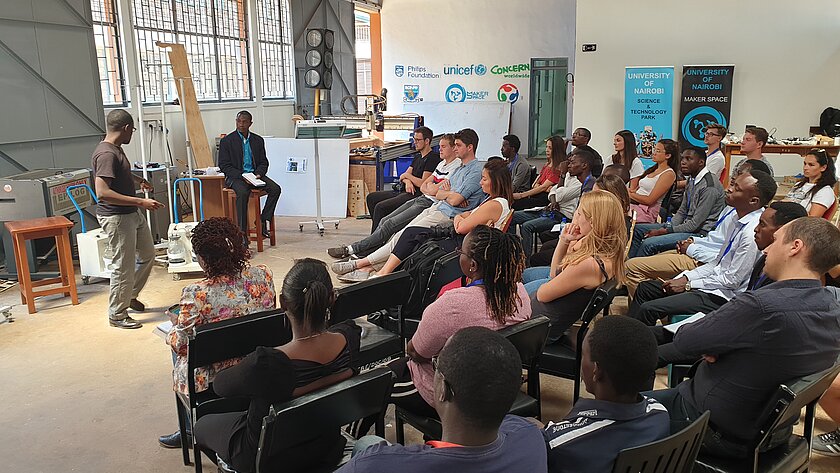Applied Entrepreneurship Academy
In cooperation with Kenyatta University (KU) and the Chandaria Business Innovation & Incubation Centre (Chandaria BIIC) in Nairobi, Kenya, the HNU Africa Institute has initiated a project to improve entrepreneurship education at KU and increase the number and quality of innovative startups being established by KU graduates. The 4-year project (2017-2020) is supported by the German Academic Exchange Service (DAAD) with funds from the German Federal Ministry for Economic Cooperation and Development (BMZ). The industry partners of the project are Booth Extrusions Ltd. in Kenya – a company of the Chandaria Industries Group – and Raach Solar in Germany.
Partners
Project leader
Professor Dr. Thomas Bayer
Professor with focus on International Management
Director Africa Institute
Project Manager StartupSÜD

Impressions

Project description
Project description
Project Goals
On the one hand, the Applied Entrepreneurship Academy (AEA) program aims at enabling graduating students of KU to develop sustainable business concepts around their innovative ideas by equipping them with necessary innovative thinking and entrepreneurial techniques. On the other hand, AEA aims at broadly establishing entrepreneurial thinking and practice-orientation into regular teaching programs of the different KU schools by training a significant number of KU lecturers in these fields.
The specific goals of the project are:
- developing education modules for entrepreneurship
- enabling integration of thesis projects with entrepreneurial character
- increasing the number of successful start-ups established by KU students and graduates
- bringing innovation and innovative thinking to KU's young graduates and supporting the further development of the country
Skill Development
Within the AEA program the participating lecturers of KU are trained to act as multiplicators in their respective KU schools with the goal to train other lecturers and to integrate practice- and innovation-oriented elements into their teaching approaches in regular curriculum classes. They are trained in the following areas:
- entrepreneurial mindset, personality & teams
- innovation creation and innovative thinking
- design thinking & lean startup
- understanding customers & markets
- Branding and Marketing
- Logistics and Supply Chain Management
HNU students as business coaches
In each project year, a 10-day excursion of HNU business students to Nairobi is conducted in September. The HNU students are pairing up with KU entrepreneurs and act as business coaches in the process to improve and sharpen the entrepreneurs' business ideas and business models. During this excursion the HNU students apply their business knowledge and learn about Kenyan entrepreneurship culture, economy, and society.
Project schedule
20171st project year
- May: Project Kick-off
- June: Development Workshop
- August: Lecturers - Train the Trainer
- September: Entrepreneurs - HNU Student Project
- September to November: Entrepreneurs - Pilot Workshops
- November: Industry & Investor Conference
20182nd project year
- March: Evaluation and Adaptation Workshop
- May to June: Lecturers - Train the Trainer
- September. Entrepreneurs - HNU Student Projects
- May to October: Entrepreneurs - Operational Workshops
- November: Industry & Investor Conference
20193rd project year
- March: Evaluation & Adaptation Workshop
- May to June: Lecturers - Train the Trainer
- September: Entrepreneurs - HNU Student Projects
- May to October: Entrepreneurs - Pilot Workshops
- November: Industry & Investor Conference
20204th project year
- March: Evaluation & Adaptation Workshop
- May to June: Lecturers - Train the Trainer
- September: Entrepreneurs - HNU Student Projects
- May to October: Entrepreneurs - Operational Workshops
- November: Industry & Investor Conference
- November: Evaluation & Closure Workshop
20215th project year
Pandemic-related project extension to make up for face-to-face events that could not be held in 2020
Funding

supported by the DAAD with funds from the Federal Ministry for Economic Cooperation and Development (BMZ)






